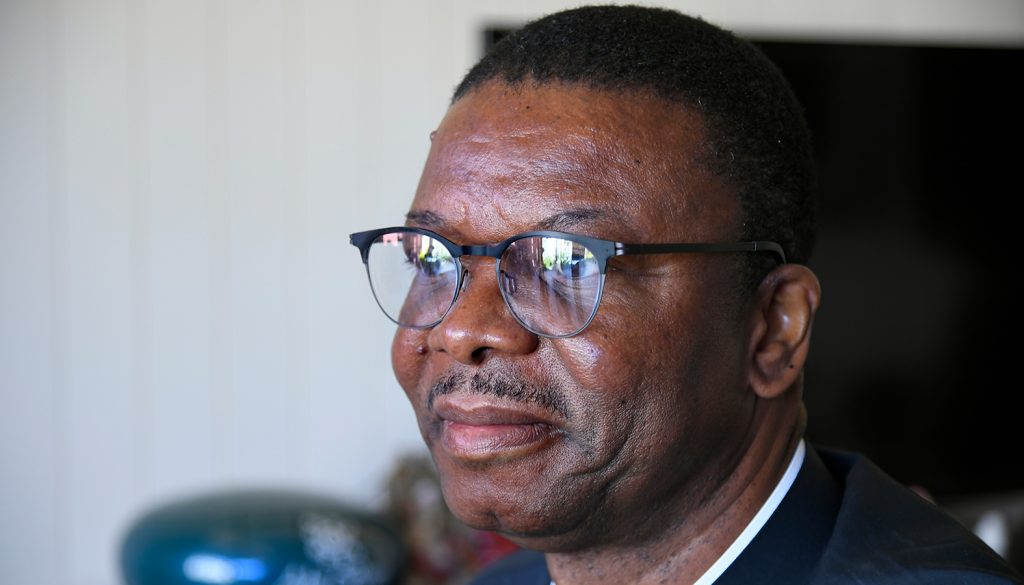The bandits stepped from the roadside bushes and opened fire just as Father Aloysius Ezoenyeka finished praying the rosary. The pastor of Sacred Heart Church in Ventura was driving on a deserted highway as New Year’s Eve afternoon dimmed into evening, on the way from the airport in Lagos to visit his family in southeastern Nigeria.
He floored the gas, not slowing as bullets tore into the car, believing he was more likely to die if he stopped. One round stuck him in the stomach as another sliced into a tire.
“But I had to hold the wound and keep driving,” he said.
Father Ezoenyeka is now back at his parish in the Archdiocese of Los Angeles, describing himself as “about 90%” healed. His survival — which owes much to a little boy and his father who stepped up as good Samaritans — was far from assured.
As he fled his attackers, Father Ezoenyeka knew he would have to pull over before he passed out. At last he spotted a makeshift truck stop.
“As soon as I said, ‘This is where I need to stop,’ the engine died,” he recalled.
He staggered from the car and collapsed.
But there was no help. The trucks he had seen were broken down. Sympathetic people gathered as he lay on the ground, bleeding, for almost an hour.
“They didn’t know what to do. They had no vehicle. There was no help coming,” he said. “I was praying.”
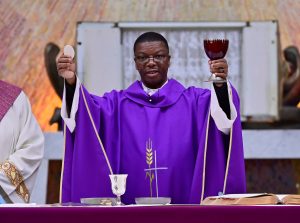
The spiritual journey that appeared about to reach its earthly end had begun in a Nigerian shantytown 55 years earlier. As a youth, church bored Ezoenyeka. He was glad to feel he had left God behind when he moved away to Lagos and became a disc jockey.
Then, in 1988 he experienced a profound conversion through the Catholic charismatic renewal. He became a youth leader in his parish, where young people responded to his exhortations. He began to wonder if God was calling him to the priesthood.
One year, on the feast of his patron, St. Aloysius, he requested a Mass to help him discern his vocation.
“The dominoes began to fall,” he said.
He entered a Benedictine monastery, where he was ordained in 2002. But, while leading retreats and teaching, he began to sense he was called to active ministry outside the monastery. In 2004 his community sent him for a “pastoral year” in Los Angeles, to discern whether that was indeed his call.
It was. Father Ezoenyeka began graduate studies in counseling, while assisting in parishes. He loved the work. Eventually, the Archdiocese of Los Angeles asked him to consider incardination — leaving the Benedictines to become a diocesan priest. After a year of discernment, he began the multiyear process that led to incardination in 2016.
When he flew out of Los Angeles on Dec. 29, he had not been back to visit his family for three years.
He knew the dangers of COVID-19, but otherwise felt safe. The horrific violence in northern Nigeria from ISIS sympathizers who kidnapped, raped, tortured, and killed Christians was far to the north of his hometown. He did not know that, since his last visit, southern Nigeria was experiencing a rash of violence between nomadic herdsmen and local farmers, as well as banditry and kidnapping from criminal bands.
Although he did not know it, a few days before he left Los Angeles, an old friend had also faced a harrowing ordeal in his native country. Father Moses Chikwe, once a fellow Nigerian student priest from Ezoenyeka’s early days in LA and now an auxiliary bishop in the Nigerian Diocese of Owerri, had been kidnapped.
The day after Father Ezoenyeka was shot, Bishop Chikwe was freed, reportedly without ransom. Father Ezoenyeka would also learn that a Nigerian expatriate from Southern California had also gone home to Nigeria for the holidays, was kidnapped and then murdered, even though his family had paid a ransom.
Nothing like that crossed his mind as he picked up a car from friends at a Dominican community in Lagos and headed home.
“I had lived in Nigeria all my life [before coming to the U.S.]. I had traveled at night and had no problem,” he said.
He has no idea who attacked him.
“They were just shooting indiscriminately. I didn’t know if they were robbers or herdsmen or kidnappers,” he said. “I felt that they didn’t want me alive. I decided I wasn’t going to stop. If they killed me, that’s fine and if they didn’t — that’s fine too.”
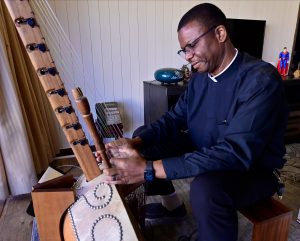
He lay for an hour on the ground at the truck stop, bleeding out.
At around 6 p.m., a little boy, not quite 11 years old, approached. Then the child ran for his father — who owned a cargo van — shouting that a man was dying and needed help.
“The dad came and brought his van,” Father Ezoenyeka said.
The father was a former policeman, known as Sonny Mopo or “Sonny the Cop.” The little boy’s name — in English, with no translation needed — was “God-is-Great.”
“You couldn’t make that up,” Father Ezoenyeka said. “That young man literally saved my life.”
Sonny the Cop fetched his gun because they would have to pass the site of the ambush to reach the nearest clinic. He told his little son to drive, then literally rode shotgun.
With God-is-Great at the wheel, the bandits again emerged from the bush, but Sonny was ready.
“He started shooting his gun in the air. The bandits thought it was the cops and they ran,” Father Ezoenyeka said.
He was in the back, accompanied by a Catholic man who encouraged and prayed for him nonstop for the next seven hours.
But when they arrived at the small clinic, there was little more help than at the truck stop. It had no surgeon, no supplies or equipment to treat a serious wound. Sonny the Cop and the Catholic man who was looking after Father Ezoenyeka pleaded for an ambulance to take him to the teaching hospital in Benin City.
The staff doubted whether triage protocols justified putting gas in the ambulance for the two-hour round trip. The priest was vomiting blood.
“I could hear them telling the doctor to attend to other patients, that there was no way this man could make it,” Father Ezoenyeka said.
He made his peace with God.
“I was ready. I had peace with it and told him that I am really grateful to him for the amazing life he has given to me. I told him I was sorry for everything I had done wrong. I handed over my spirit,” Father Ezoenyeka said.
“I was actually a bit curious to see the final act of a human dying, I was waiting for it, curious to see how it would happen.
“It didn’t.”
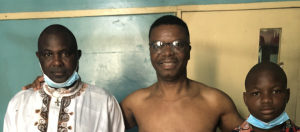
After two hours at the clinic, he was loaded into an ambulance for the trip to the University of Benin City Teaching Hospital.
He arrived around 10 p.m. Most of the doctors, including all surgeons, had gone home to spend New Year’s Eve with their families. The staff on hand doubted anyone could save him.
That’s when a network of Nigerian priests went into overdrive. When Father Ezoenyeka’s friends were notified of his plight, they started calling everyone they thought might help, including the archbishop of Benin City and professors at the university to which the hospital was connected.
A surgeon returned, and determined that a whole team of surgeons would be needed to try to save him.
“A few of the doctors felt it was too late, but one or two said they didn’t care, that they were going to go through with the surgery,” Father Ezoenyeka said.
“From then on, it was just an unbelievable array of goodness.”
He had lost so much blood that they had to obtain more before proceeding. The five-hour operation began around midnight.
He emerged from unconsciousness surrounded by surgeons, some of his priest friends, and his sister and brother.
“When I responded, there was a huge cheer, and a lot of ‘Welcome to 2021!’ ” he said.
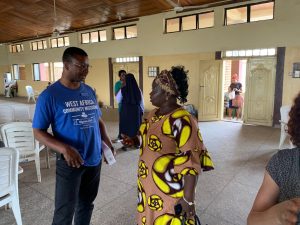
Nine time zones away in Santa Barbara, Auxiliary Bishop Robert Barron, Father Ezoenyeka’s regional bishop, picked up his phone the afternoon of Saturday, Jan. 2, and heard a story that had changed with multiple retellings and not entirely factual. Bishop Barron was told that Father Ezoenyeka was the sole survivor of an attack that had also killed members of his family.
“We heard that he had been shot many times and was left on the side of the road,” Bishop Barron said. “When I first got the news, it was that he was dying. We had very little hope.”
The next morning, Bishop Barron spent the day at Father Ezoenyeka’s parish, Sacred Heart, to address parishioners personally at every Mass. Though he didn’t say it in so many words, Bishop Barron believed he was preparing the parishioners for their pastor’s death.
Soon after, however, Bishop Barron received word that Father Ezoenyeka was “in a decent hospital, being well cared for.”
But new danger arose as the news media caught wind of the story. Experts on Nigeria warned the archdiocese that, if Nigerian criminals realized that a priest with American connections was helpless nearby, they might kidnap him for ransom. The communications staff of the archdiocese prevailed on journalists not to pursue the story until Father Ezoenyeka was safe.
When Bishop Barron reached Father Ezoenyeka by phone, “he was very weak. I could barely understand him. But he was conscious, and he knew who I was.”
The bishop was inspired — but not surprised — by his attitude.
“He is a deeply spiritual man, who would read anything that happened to him from the standpoint of God’s providence,” Bishop Barron said. “Not once has he expressed any anger or desire for vengeance against the person who shot him.”
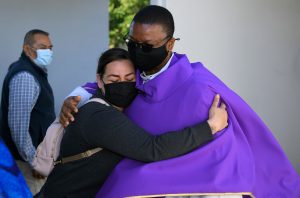
Nor has he felt it.
“I did pray for these criminals, that God would touch their hearts and change them,” Father Ezoenyeka said.
His response to the entire incident has been one of overwhelming gratitude.
He was thankful for the doctors, and to the nurses, who placed his bed in a spot where they could constantly monitor him. He was grateful to the stranger who prayed at his side during the frantic search for medical help, urging him to hang on. He was moved by the love of his brother priests who called powerful people late on a holiday night to get him the medical care necessary to save his life.
He feels inexpressible gratitude for Sonny the Cop and God-is-Great — non-Catholic Christians — who returned to the truck stop to secure his belongings and place them in the care of his family and priest friends. He remains in touch with them, hoping he can help God-is-Great get the education he needs to fulfill his dream of becoming a doctor.
Most of all, he is grateful to God.
“God could not have been more wonderful to me. Not just because I survived. If I had died, I would have said the same thing,” he said.
“It was one of the most powerful spiritual experiences I ever had in my life. I have no doubt that the whole thing that happened to me was guided by God, including the bullet. Many things could have happened that didn’t. It could have struck my head, my chest, my liver. But it went just slightly below the lung and shattered the intestine. And that was at the time that I had just finished praying the rosary.”
He cherishes the love and concern of his American friends, parishioners, and superiors, who were ready to do whatever it took to bring him back to the United States for treatment. But it was important to him to recover in Nigeria in the care of those who had saved his life.
“I felt that the care I received from the doctors and nurses at [the teaching hospital] was really world standard,” he said.
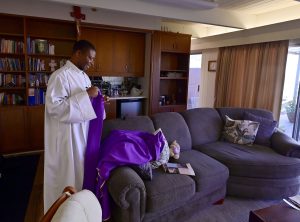
After testing negative for COVID-19, he left Nigeria on Feb. 8, arriving in Los Angeles the next day and quickly returning to parish duties. He is now noticeably thinner, having dropped 25 pounds over the course of the ordeal.
His near-death experience “changed my perspective on life, it changed me as a priest,” he said. “It taught me how fleeting, how short life is, that sometimes we focus too much on things that don’t matter.”
He is no stranger to the medical needs in the global South — his parish runs a medical mission that has helped people in many countries, including a Nigerian refugee village. But he had never realized how ill-equipped regular medical clinics were until he was the one in need of help.
On past trips home he has carried toys for children. Now he wants to bring medical supplies. And he intends to pay more pastoral attention to parishioners with medical emergencies, and the health care workers who care for them.
“While I was in that ward with so many people suffering, people who died there, I saw the real work of trying to save human life,” he said.
He feels humbled and affirmed that many of those who helped him were Catholics who went the extra mile because he is a Catholic priest.
“Embracing your priesthood is such a joy,” he said. “They love you. The least you can do is love the people of God back, be there for them and pray for them and help them to love Jesus. To enjoy the priesthood is a wonderful gift. I don’t see this as a terrible thing that has happened to me.
“This has really changed me.”
